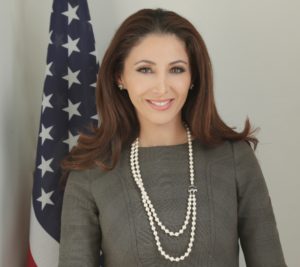On 16 May join the American Security Project (ASP) and Florida International University (FIU) for an in-person discussion with Executive Director of the South Florida Defense Alliance Richard M. Miller, Florida House Representative James Vernon “Jim” Mooney, JR., ASP Consensus for American Security Member and former Florida Chief Resilience Officer Julia Nesheiwat, PhD., and FIU Professor Dr. Jayantha Obeysekera, on military base resilience and the national security implications of climate change on foreign policy. This event is a continuation of ASP’s National Climate Security Tour. Interim FIU President Kenneth A. Jessell will open the event and Miami Chief Bay Officer Irela Bague will moderate the discussion.
South Florida is home to key U.S. national security assets like Homestead Air Reserve Base which hosts the U.S. Southern Command, Naval Air Station Key West, and Coast Guard Station Miami. Acute shocks from rising seas, flooding, heat waves, and other climate change related threats can reduce military readiness at these installations. Coordinated partnerships between the public and private sectors are key to making bases and adjacent communities resilient to the impacts of climate change.
Thank you to our partner, Florida International University.
Event Details:
This in-person event is open to the public.
16 May 2022, 2:00 – 3:30 PM EDT
Address: Florida International University Pavilion, Modesto A. Maidique Campus (MMC)
11200 SW 8th Street – Management and Advanced Research Center 210 Miami, FL 33199
Click here to be directed to the nearest parking garage.
About the Moderator & Panelists
 Julia Nesheiwat, PhD.
Julia Nesheiwat, PhD.
Dr. Julia Nesheiwat is a recognized expert for energy, environment, climate change, and national security issues as a public servant, academic, former military officer, and US diplomat. She is a Distinguished Fellow at the Atlantic Council, and since December 2020, has served as Commissioner on the US Arctic Research Commission reporting to the White House and Congress on domestic and international Arctic issues.
Dr. Nesheiwat brings unique experiences having served over twenty years in international energy diplomacy, critical infrastructure protection, climate, environmental science, and national security serving in the Bush, Obama, Trump, and Biden administrations. From July 2019 to February 2020, she served as Florida’s first Chief Resilience Officer, launching a new office dedicated to addressing the environmental, physical, and economic impacts of climate change and emergency preparedness for the state.
From February 2020 to January 2021, Dr. Nesheiwat served as the Deputy Assistant to the President for Homeland Security & Resilience, and from 2011 to 2014, she served as Deputy Assistant Secretary of State where she worked to build the first Energy Resources Bureau at the Department of State. Prior to holding those positions, she served as Chief of Staff to US Special Envoy for Eurasian Energy as well as the Under Secretary for Energy, Environment, and Business. Her PhD dissertation from Tokyo Tech, “Post-Disaster Reconstruction in Energy Policy & Resiliency” focused on post-disaster reconstruction of coastal towns suffering from lack of power, flooding, and rising sea levels. She served on the World Economic Forum’s Global Advisory Council on low-carbon energy transformation as well as an International Affairs Fellow with the Council on Foreign Relations. Dr. Nesheiwat is a visiting professor at the Naval Postgraduate School on Energy Security and has lectured at Stanford University and the University of California San Diego.
She received her BA from Stetson University, MA from Georgetown University, and PhD from Tokyo Institute of Technology.
 Irela Bagué
Irela Bagué
Chief Bay Officer
Miami-Dade County
Irela Bagué is Miami-Dade County’s first Chief Bay Officer (CBO). The CBO focuses on water quality issues, policies, and appropriations related to the health and recovery of Biscayne Bay. She acts as an advisor to the County Mayor and County Commission and a liaison between County departments, County boards, external agencies, stakeholder groups, and local, state, and federal governments.
Previously, Ms. Bagué chaired Miami-Dade County’s Biscayne Bay Task Force, leading the development of a final report listing a series of recommendations to improve Biscayne Bay’s health and sets a path forward for long term recovery and restoration.
Bagué is a former Governing Board Member of the South Florida Water Management District (SFWMD), where she held the position of Vice-Chair. During her time at SFWMD, she was responsible for kicking off the Comprehensive Everglades Restoration Plan, establishing policy for water resources development, flood control, and water quality protection, including serving as Chair of the Miami River Commission leading the Miami River dredging project. She is a longtime advocate of Everglades and Biscayne Bay restoration, climate change and promotes ethnic diversity and inclusion in the environmental movement.
Before rejoining the County government, Ms. Bagué served as President & CEO of Bagué Group, a full-service consulting firm with over 20 years of experience in Florida with expertise in strategic communications, water policy, sustainability, climate mitigation, adaptation, and resilience.
Ms. Bagué serves as Chair of the Resilience Committee of the Greater Miami Chamber of Commerce and recently served as the acting Executive Director for Resiliency Florida and Chair of the City of Coral Gables Sustainability Advisory Board.
 Jayantha T. Obeysekera
Jayantha T. Obeysekera
Director of the Sea Level Solutions Center; Research Professor
Jayantha Obeysekera is the Director and Research Professor in the Sea Level Solutions Center. Obeysekera previously served as the chief modeler at the South Florida Water Management District, where he had a leading role in the modeling of the Everglades and Kissimmee River restoration projects. He was the co-author of the sea level rise projections report published by NOAA for the National Climate Assessment and a lead author for the Southeast Chapter of the National Climate Assessment. He served on the federal advisory committee which directed the development of the National Climate Assessment in 2014. Obeysekera was a member of multiple National Research Council panels dealing with water resources issues, focusing on the Edwards Aquifer system in Texas, Klamath River in California and Oregon, and the California Bay-Delta. He also served on the Coastal Assessment Regional Scenario Working Group associated with the Department of Defense and co-authored a report on regional sea level projections for Department of Defense facilities across the globe.
He previously worked as an assistant professor in the Department of Civil Engineering at Colorado State University and a research affiliate professor at Florida Atlantic University. He also has taught courses in the water resources area at George Washington University in Washington, D.C. Obeysekera is the 2015 recipient of the Norman Medal of the American Society of Civil Engineers.

Richard M. Miller
Founder/CEO PHAROS Mission Critical Solutions
Executive Director, South Florida Defense Alliance
Vice Chair, Florida Defense Alliance
Deputy Director, Adrienne Arsht-Rockefeller Foundation Resilience Center, Atlantic Council
Rick founded PHAROS Mission Critical Solutions to provide a network of functional, government, and commercial business sector experts who work collaboratively with enterprises to achieve success by capturing risks, gaps, and inefficiencies in their unique operations, technology, management, and leadership elements that are critical to sustained mission success. PHAROS also partners with numerous technology companies to design and build integrated, bespoke technical solutions to tough operational challenges.
As a former cruise line operations executive, he had responsibility for the largest, single global fleet of ships in the industry leading over a dozen functional shore-based teams and thousands of shipboard mariners. He was involved in guiding corporate-wide maritime safety initiatives, developing enhanced policies, procedures and training programs for over 100 ships and 100,000 employees across a broader corporate fleet. Additionally, he personally led the design, development, and operation of the largest and most advanced Fleet Operations Center in the commercial maritime industry.
Rick’s cruise line experience followed a successful career in the U.S. Navy including command at sea, with numerous shipboard and staff assignments across a number of specialties. Operationally, he was on extended deployments seven times across multiple regions, sailing all the world’s oceans around five continents. He participated in Operations Desert Shield/Desert Storm, Operating Enduring Freedom, counter-piracy and counter-terrorism operations, and dozens of contingency operations in Europe and the Balkans, Africa, the Middle East, Central and South Asia, the Caribbean and Latin America.
Ashore, he led current operations for U.S. Southern Command. A proven specialist in both strategic planning and financial management, he served multiple tours in the Pentagon as part of both the Navy and Joint Staffs directing and planning Navy’s programs and budgets as well as guiding development of defense appropriations to support wartime activities with Congress and various administrations. He served on the personal staffs of both the Vice Chief of Naval Operations and Chief of Naval Operations and worked special support on several issues for the Chairman of the Joint Chiefs of Staff. He also spent a year as the Navy’s Federal Executive Fellow at the Institute for the Study of Conflict, Ideology and Policy.
Rick is active in the South Florida community. He leads the Arsht-Rock Resilience Center’s Resilience Hubs Networking Strategy project for Miami-Dade County. He is on the Board of Directors of the South Dade Economic Development Council and is Executive Director of the South Florida Defense Alliance (SFDA). Through SFDA, he assists the South Florida Regional Planning Council in developing and executing a regional Military Installation Resilience Review (MIRR). The South Florida MIRR is the first of-its-kind regional approach in the United States encompassing four installations, four military Services, three counties and multiple municipalities. Additionally, he serves as Vice Chair of the state-wide Florida Defense Alliance.
Rick is a graduate of the U.S. Naval Academy, distinguished graduate of both the U.S. Naval War College and U.S. National War College and the Catholic University of America with undergraduate and graduate degrees in engineering, international affairs, and strategic planning disciplines, as well as doctoral work in political economy. He is the author of over 30 articles, professional papers, and the book Funding Extended Conflicts, a history of U.S. war financing. Rick was the winner of the Naval War College’s B. Franklin Reinauer Defense Economics Prize and the U.S. Naval Institute’s Naval History Essay Prize.


 Julia Nesheiwat, PhD.
Julia Nesheiwat, PhD. Irela Bagué
Irela Bagué Jayantha T. Obeysekera
Jayantha T. Obeysekera





